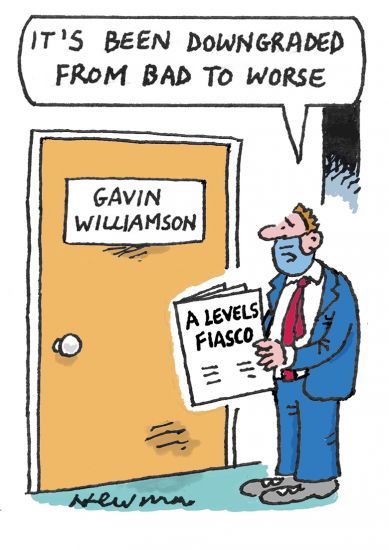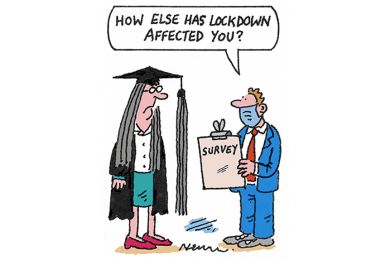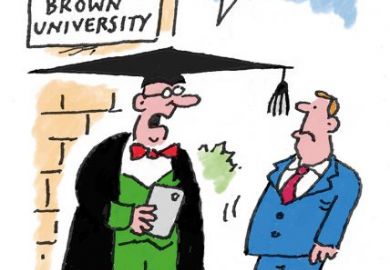
Will Gavin Williamson still be in a job by the time you read this? There were mounting calls for England’s education secretary to be sacked after his humiliating U-turn over A-level grading, which culminated on 17 August in the abandonment of an algorithm that downgraded more than a quarter of a million A-level results, effectively skewering the hopes and dreams of students – apart from those attending private schools – in a bid to protect the integrity of an exam-less assessment system. Just two days earlier, Mr Williamson had told The Times: “This is it. No U-turn, no change.” Now universities face the headache of trying to accommodate students who now meet the requirements of offers they previously fell short of – and some of these applicants will want to release themselves from other offers that they had previously confirmed. This omnishambles can now be added to the long list of failings of Boris Johnson’s government in its handling of the coronavirus pandemic – and Mr Williamson also bears significant responsibility for another catastrophic shortcoming, the far-too-lengthy disruption to schoolchildren’s education. Surely it is only a matter of time before he is expelled from the Cabinet?
Of all the restrictions imposed on traditional student life in the coronavirus era, it was of course the “bonking ban” that attracted the attention of the UK’s tabloids. “Randy students who risk breaking rules for a bunk-up face fines of up to £800,” reported The Sun of new guidelines at the University of Bristol that limit undergraduates to a bubble of 12 to 15 students in their accommodation, and which ban parties and overnight visitors in halls. Students will only be allowed to meet people not in their “living circle” outside and while following social distancing rules, said The Sun, which added that other institutions were drawing up similar guidelines. Needs must, in these uncertain times. But does anyone else, apart from The Sun, still say “bonking”?
One of the strangest higher education stories of the summer erupted when it was announced that a queer Native American professor known to thousands on Twitter had died of Covid-19. Scientists around the world sent condolences and expressed anger that her university had forced her to continue teaching as coronavirus spread across the US. But the anger turned to shock and disbelief when it emerged that the individual known as @Sciencing_Bi did not exist and instead was an elaborate fake identity that had run for the past four years, interacting frequently with scientists and posting regularly about life as a bisexual Indigenous American scholar, including her experience of sexual harassment. Another academic, BethAnn McLaughlin, former associate professor of neuroscience at Vanderbilt University in Nashville, told The New York Times that she “took full responsibility” for her involvement in creating the fake account. “My actions are inexcusable,” she said.
After Jerry Falwell Jr was placed on leave by Liberty University, will change finally come to the Trump-aligned US campus? The devoutly Christian institution asked its president to “take an indefinite leave of absence” after he posted an online photo of himself on a yacht holding a drink with his arm around his wife’s assistant and his trousers unzipped. His behaviour on the yacht, as shown in the Instagram photo, would have earned a Liberty student more than $9,000 (£7,000) in fines and possible expulsion. Previously it has been alleged that Mr Falwell partied at nightclubs, graphically discussed his sex life with employees and made extensive personal use of university funds, while in June the university made him apologise for a Twitter post that included a face mask with a Ku Klux Klan depiction. Liberty attributed his behaviour to the “substantial pressure” that comes with “the burdens of leading a large and growing organisation”.
England’s higher education regulator has been left with a hefty bill after a for-profit college won an appeal against a court ruling that blocked it from accessing public student loans. In March, a court backed the Office for Students’ decision to refuse registration to the Bloomsbury Institute over quality and management concerns. But the Court of Appeal announced on 14 August that it had quashed the decision and ordered the OfS to reconsider the institution’s application. The court ordered the OfS to repay the institution £144,500 in costs as well as legal costs. The OfS has been facing several legal challenges from institutions refused inclusion on its register of providers, so the new ruling could have significant ramifications for the sector.
Register to continue
Why register?
- Registration is free and only takes a moment
- Once registered, you can read 3 articles a month
- Sign up for our newsletter
Subscribe
Or subscribe for unlimited access to:
- Unlimited access to news, views, insights & reviews
- Digital editions
- Digital access to THE’s university and college rankings analysis
Already registered or a current subscriber?



